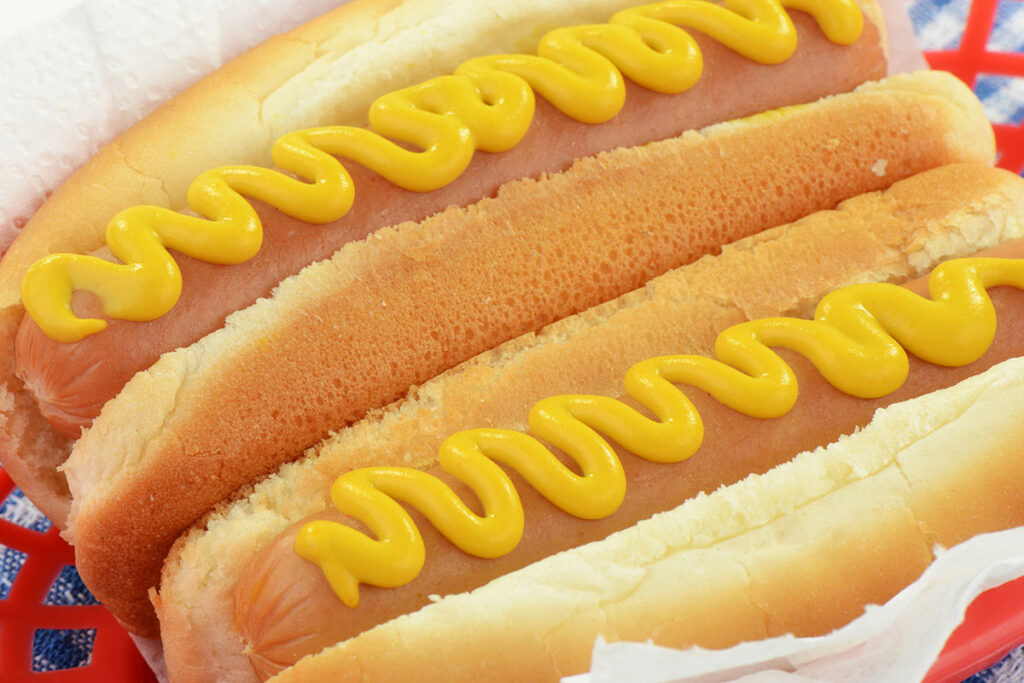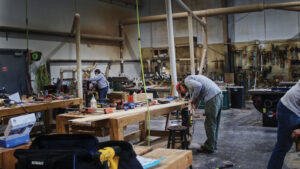From rice cakes to Italian meats, hot dogs, and organic milk, COMO helps feed America.
With more than 300 restaurants, coffee shops, in-store eateries, and specialty cafés providing an array of selections from pastries and pies to fast-food burgers and five-course dinners, it’s clear that food is big business in Columbia. Any drive down Stadium Boulevard or along Grindstone Parkway will further bolster that conclusion.
But what about the footprint and economic impact of some of the nation’s largest food manufacturers that call Columbia home? Head to Columbia’s north side and along Paris Road/Route B to find the Kraft Heinz food manufacturing plant that makes every Oscar Meyer hot dog sold in America. (About six million per day.) Or if rice cakes are your snack of choice, you’ll find Quaker Oats/Pepsico where a wide variety of those crunchy orbs have been produced for almost 30 years now.
Maybe you insist on organic milk from Aurora Organic Dairy on your family’s breakfast table or you want nothing but the best for your Papa John’s pepperoni pizza, which uses authentic Italian meats produced along the Route B corridor at Principe Foods, the Swift Prepared Foods plant.
Not all the food manufacturing jobs are slotted into that corridor, though. For the eco-conscious vegetarians among us, there’s Beyond Meat with two locations in the city and with a history that is tethered to the University of Missouri and Missouri’s number one field crop — soybeans. The invention uses the plant protein to mimic the texture of meat, and Beyond Meat’s first mass-marketed product was chicken strips (sans actual chicken meat, of course).
Beyond Meat is just one example of how the way we eat has changed. Fast-food drive-throughs and coffee shops are ubiquitous across Columbia’s landscape and won’t likely fade away anytime soon, but healthful meals and food have seen a substantial uptick among consumers, especially since the pandemic. Whether processed foods or manufactured plant protein that mimics meat, the constant need for raw materials to feed hungry consumers hasn’t changed.
The Trade & Industry Development publication and website shined a light on Columbia’s place in food manufacturing in June 2022 when it declared that Columbia was among the regions that were keeping America fed. That headline was as much sales pitch as it was informational, because the publication’s target audience is administrators and C-suite executives in their fields, corporate real estate pros, and site consultants who might be looking to find a prime location for another client.
“Columbia is an ideal location for food production due to wide access to ingredients,” the publication stated. “Missouri’s agricultural products include rice, soybeans, cattle, turkey and hogs, and surrounding Midwest states also provide ingredients for products produced in Columbia.” Trade & Industry Development also gave a nod to Mizzou’s College of Agriculture, Food and Natural Resources, which provides access to research and innovation in animal sciences, food science and nutrition as well as opportunities for internships and employment.
Furthermore, the Moberly Area Community College campus in Columbia offers an AAS degree in mechatronics and produces technicians trained to keep production lines, testing, and maintenance equipment performing effectively.
Local economic development leaders were eager to tout Columbia’s place among food manufacturers.
“Columbia has been a business-friendly community for decades for the food industry with Kraft Heinz and Quaker Oats, and the addition of employers like Beyond Meat, Aurora Organic Dairy, and Swift Prepared Foods solidifies our standing in the food manufacturing industry,” said Bernie Andrews, executive vice president of Columbia Regional Economic Development Inc. (REDI.)
The food business-friendly environment offers even more attraction with the possibility of tax-abatement incentives like Chapter 100 bonds from Boone County to take some of the sting out of large capital investment projects. The county and city also coordinate with the public/private Missouri Partnership and the state of Missouri on tax and job training incentives. Those incentives are not without controversy and detractors, although the tax-supported entities that are most affected — namely, Columbia Public Schools, the library district, and the Boone County Fire Protection District — put their support behind those incentives with the view that those manufacturing investments might be made elsewhere, taking the jobs and economic activity with them.
Here’s a closer look at Columbia’s major food manufacturers:
PepsiCo Quaker Oats
NASDAQ: PEP
4501 Paris Road
Quaker Oats runs a production facility in Columbia that has made rice cakes since 1995 and is only one of Quaker’s four plants to produce 18 flavors of rice cakes. It broke ground on a $20 million plant in 1994. In August 2001, Quaker Oats was acquired by PepsiCo for $14 billion.
The Columbia plant employs some 360 people and has technology and training partnerships with Mizzou and MACC.
The plant did not request tax incentives for construction or expansion.
Columbia Foods
(Kraft Heinz)
NASDAQ: KHC
4600 Waco Road
The Columbia plant began operations in 1985 with 150 employees focused on the Oscar Meyer brand. The plant currently employs around 440 workers according to REDI.
It is the only Oscar Meyer hot dog plant with 24/7 production. (You might have seen the iconic Wienermobile around town.)
In 2015, Kraft and Heinz merged and announced a $114 million investment for a 25,000-square-foot expansion, and it sought Chapter 100 bond tax incentives, asking for a 75 percent tax break for 10 years. While the company stood to save $4 million over the ten-year plan, the affected taxing entities — CPS, fire district, and others — would still receive about $2 million more because of the expansion.
The expansion also meant a reduction in jobs, because three of the oldest hot dog production lines were replaced with two high-speed lines that needed fewer people to run them. At the time, REDI officials said workforce reduction was never a positive thing but preserving as many as 350 or more jobs was worth offering the tax incentives.
When Kraft Heinz merged, it reportedly became the third-largest food and beverage company in North America with annual revenue of about $28 billion.
Beyond Meat
NASDAQ: BYND
2400 Maguire Boulevard
The plant-based burger startup began in Columbia in 2009 “to access the outstanding research being conducted at the University of Missouri,” said Ethan Brown, CEO and founder.” Beyond Meat announced in 2018 its plan to expand and triple its production capacity in Columbia, creating as many as 250 new jobs.
The expansion increased Beyond Meat’s footprint from 30,000 to 100,000 square feet.
A news release from Missouri Partnership touted the expansion as evidence that “Missouri gives food solutions companies rapid access to global markets, extensive distribution options, a friendly regulatory environment, and access to a diverse customer base.”
Beyond Meat did not request Chapter 100 tax abatement for its investment.
Swift Prepared Foods
Subsidiary of JBS USA
NASDAQ: SFDWF
5008 Paris Road
The $200 million, 325,000-square-foot plant opened in April 2023 on 80 acres in north Columbia. The state-of-the-art Italian meats facility produces prosciutto, pepperoni, mortadella, soppressata, and salami under Swift’s emerging brand, Principe Italia.
Swift has also been operating a $68 million bacon processing facility in Moberly since 2021.
At the grand opening event in April, Tom Lopez, president of Swift Prepared Foods, said the plant was “the culmination of years of hard work and investment by our team and our partners in Missouri.” Lopez said the company’s financial outlay represented the largest-ever private investment in Columbia. He cited cooperation between state and county governments, a business-friendly environment, the ability to access raw material, and the coming expansion of the I-70 corridor as reasons to locate in Columbia.
Gov. Mike Parson and Columbia mayor Barbara Buffaloe lauded the company, the jobs it creates, and the economic activity that will result from the investment. Buffaloe added, “This solidifies our community’s standing in food management.”
The plant created 100 jobs, with plans to hire 100 to 200 more in the first 12 months of operation. The Columbia Missourian reported that the plant will have an annual payroll of $13.23 million.
Swift Prepared Foods received several tax incentives from both the state and the city, as well as Chapter 100 tax abatement of 75 percent of real property taxes over the next 10 years and 75 percent of personal property taxes for the life of each piece of its equipment.
But local taxing entities aren’t losing out entirely. Over the next ten years, Swift will pay more than $3 million in property taxes to CPS and the other entities.
Also of note, Columbia-based Emery Sapp & Sons construction was subcontracted by general contractor Stellar to perform the grading, underground utilities, and paving work for the facility.
Aurora Organic Dairy
Privately owned.
4525 Waco Road
In 2017, Aurora Organic Dairy built a new, 127,000-square-foot organic milk processing and packaging facility.
The plant has around 130 employees and processes and packages an array of products, including milk in a variety of single-serve and shelf-stable bottles; value-added dairy creamers, including fortified and flavored milks and creamers; extended shelf-life milk in half-gallon cartons; and more.
AOD was granted, via Chapter 100, a 75 percent property tax break for two phases over a period of 13 years.










